After Life Blu-ray Movie
HomeAfter Life Blu-ray Movie 
ワンダフルライフ / Wandafuru raifuCriterion | 1998 | 119 min | Not rated | Aug 10, 2021

Movie rating
7.9 | / 10 |
Blu-ray rating
| Users | 0.0 | |
| Reviewer | 4.0 | |
| Overall | 4.0 |
Overview
After Life (1998)
After death, people have a week to choose only one memory to keep for eternity.
Starring: Arata Iura, Erika Oda, Susumu Terajima, Takashi Naito, Kyôko KagawaDirector: Hirokazu Kore-eda
| Foreign | Uncertain |
| Drama | Uncertain |
| Fantasy | Uncertain |
Specifications
Video
Video codec: MPEG-4 AVC
Video resolution: 1080p
Aspect ratio: 1.66:1
Original aspect ratio: 1.66:1
Audio
Japanese: LPCM Mono (48kHz, 24-bit)
Subtitles
English
Discs
Blu-ray Disc
Single disc (1 BD)
Playback
Region A (locked)
Review
Rating summary
| Movie | 4.0 | |
| Video | 4.0 | |
| Audio | 4.0 | |
| Extras | 3.0 | |
| Overall | 4.0 |
After Life Blu-ray Movie Review
Reviewed by Jeffrey Kauffman November 30, 2021Trust the frequently questionable Wikipedia to have an entire "category" page devoted to films about the afterlife, which as of the writing of this review includes some 88 titles, with the film currently under discussion alphabetically at least the first listed. Some of the films on Wikipedia's aggregation are perhaps dubiously categorized as being "about" the afterlife, at least insofar as things are presented in After Life, even if all of the films have some kind of connection to characters who have died and what they experience after their deaths. Hirokazu Kore-eda both wrote and directed After Life, and Kore-eda's typically distinctive humanism comes through loudly and clearly, if just as equally kind of quietly and opaquely, in a film that seeks to offer a depiction of a kind of "bureau" that handles souls in "transition", in a setup conceit that is at least somewhat reminiscent of a similar gambit in A Matter of Life and Death. The idea is arguably much more developed in the Kore-eda film than it is in the venerable piece by Michael Powell and Emeric Pressburger, with After Life documenting the efforts of "clerks" who have been tasked with getting recently deceased folks to choose one memory from their lives which the staff of the bureau will then recreate in a filmed version for that soul to "take with them" into eternity.
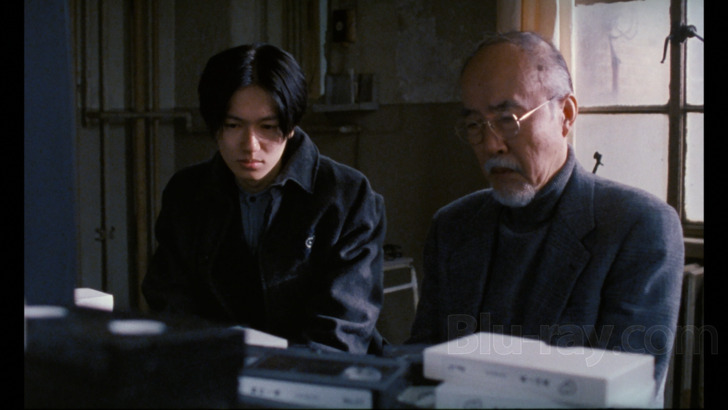
As the interesting commentary by Linda C. Erlich mentions in passing, the original Japanese title of After Life is actually a bit more similar to It's a Wonderful Life, a film that kind of interestingly is not included on Wikipedia's aforementioned list (which, at least with regard to Clarence, it arguably should have been), but the whole "bureaucratic" side of Kore-eda's film is probably as close to A Matter of Life and Death or perhaps Defending Your Life as it is to any other film in this peculiar subgenre. After Life, at least somewhat like both the Powell-Pressburger and Albert Brooks films, suggests that there is an "order" to things that assists souls in transition, and if this film never resorts to the sort of literal trial that is in A Matter of Life and Death or kind of figurative trial in Defending Your Life, there is a certain legalistic subtext to some of the developments, including the seemingly arbitrary rule that recently deceased people have three days to choose the single memory which will accompany on their eternal sleep.
In one substantial way, the Kore-eda film really has no real antecedent is that there are a whole host of people the film concentrates on, even if it turns out one particular story soon looms largest. And in fact it's the ensemble nature of After Life that gives the film some of its most distinctive content, since a broad range of people from different backgrounds (and quite radically different ages) are represented. Also figuring into the tale are the personal stories of two of the "clerks", Takashi Mochizuki (Arata) and Shiori Satonaka (Erika Oda), who, it turns out, are souls in a kind of Purgatorial transition themselves, having been unable to select a memory that would allow them to transition to whatever is awaiting next. Takashi's history in particular is revealed to have a personal connection to one of the recently departed who has shown up at the "transfer facility".
After Life is an often surprisingly moving experience, something that's especially interesting given the kind of almost dry, pseudo- documentarian approach that Kore-eda takes with the film, one that emphasizes what are almost first person confessionals by various characters delivered directly to the camera. That quasi-documentary aspect is almost deliberately at odds with one of the film's more peculiar conceits, that the bureaucracy at the center of the film does its own filming to recreate various people's memories. This seems kind of unnecessarily "meta" at times, and while Erlich mentions she finds it a rather interesting parallel, those who share my curmudgeonly tendencies may feel like the film offers enough substance not to need an additional layer of "meaning".
After Life Blu-ray Movie, Video Quality 
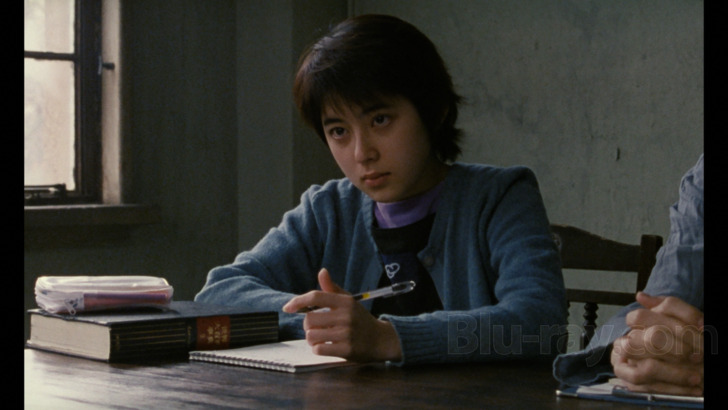
After Life is presented on Blu-ray courtesy of The Criterion Collection with an AVC encoded 1080p transfer in 1.66:1. In lieu of an insert booklet Criterion provides an accordion style foldout with this release, one which contains the following information about the transfer:
After Life is presented in its original aspect ratio of 1.66:1. Approved by director Hirokazu Kore-eda, this new 2K digital restoration was created by TV Man Union. A new digital transfer was created in 2K resolution on a DFT Scanity film scanner, from a 35 mm duplicate negative made from the Super 16 mm original camera negative, at IMAGICA Lab in Tokyo.This is an often impressive looking transfer, especially considering some of the shrouded interior scenes that are regularly utilized, though the Super 16 source and duplicate negative element can lead to some noticeably roughhewn moments with regard to grain resolution, as can be seen in screenshots 15 through 19. Things actually resolve relatively organically, but as can be seen pretty clearly in those screenshots, grain is fairly clumpy and yellowish, something that kind of interestingly tends to show up against both brighter backgrounds and scenes that are much more shaded (contrast, for example, the look of the grain in screenshot 16 with screenshot 17). There is a very slight skewing toward blue undertones throughout the presentation, but overall the palette looks nicely suffused. Kore-eda utilizes handheld imagery at several key moments, and the "jiggly cam" aspects can momentarily affect at least the perception of fine detail. I didn't notice any major signs of age related wear and tear. My score is 4.25.
The original monaural soundtrack was remastered from the digital master audio files.
After Life Blu-ray Movie, Audio Quality 
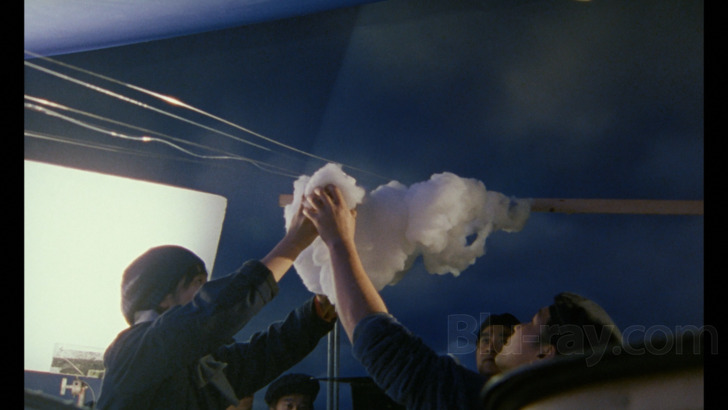
After Life has a rather subdued sound design, and so the LPCM Mono track included on this disc offers more than capable support. The film is made up almost entirely of either the first person confessionals or similarly reserved dialogue scenes, typically between two characters. As Linda Erlich mentions in her commentary, there's virtually no music of any kind (and what there is is "diagetic"). Sound effects are also fairly mundane and sporadic. Dialogue is rendered cleanly and clearly throughout. Optional English subtitles are available.
After Life Blu-ray Movie, Special Features and Extras 
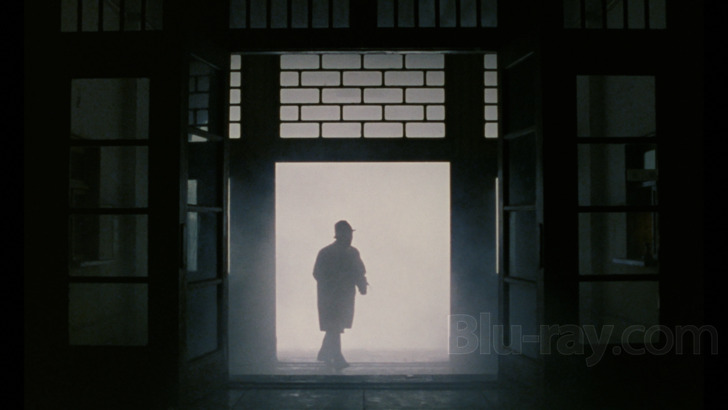
- Commentary featuring film scholar Linda C. Erlich
- Hirokazu Kore-eda (HD; 19:18) is an interview conducted in Seoul, South Korea in 2021. Kore-eda discusses what inspired the film and offers some interesting background on the production. In Japanese with English subtitles.
- Yutaka Yamazaki (HD; 19:41) is an interview with the film's director of photography, conducted in Tokyo in 2021. Yamazaki covers a host of issues, including the budgetary reasons behind shooting in Super 16. In Japanese with English subtitles.
- Masayoshi Sukita (HD; 15:38) is another 2021 interview conducted in Tokyo with the photographer and cinematographer. In Japanese with English subtitles.
- Treasure of Memory (HD; 16:52) is an artfully titled collection of deleted scenes, some of which Erlich gets into in her commentary. This looks like it may have been sourced from tape.
- Trailer (HD; 2:21)
After Life Blu-ray Movie, Overall Score and Recommendation 
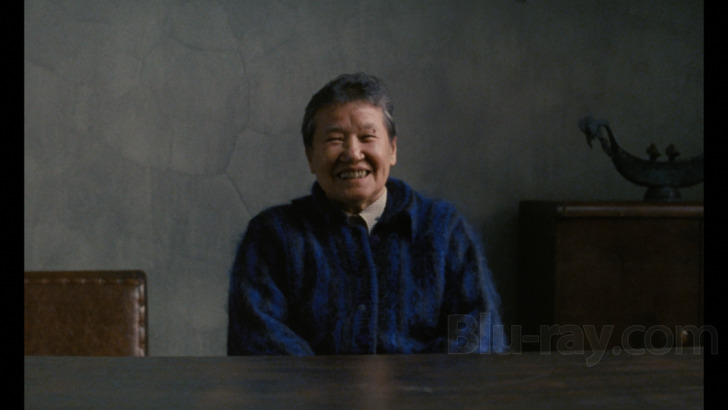
Like many of Kore-eda's works, After Life is deceptively "quiet" a lot of the time, but ends up packing an indelible emotional punch. I'm frankly not sure the whole "filmmaker" aspect even needed to be included (especially since it seems like the "bureau" has "access" to people's memories, anyway), but even with that potential minor stumbling block, this is a beautiful film that I'd compare in a way to chamber music, in that it's intimate but complex. Technical merits are generally solid and the supplementary package enjoyable. Recommended.
Similar titles
Similar titles you might also like

Maborosi
幻の光 / Maboroshi no hikari
1995

Still Walking
歩いても 歩いても / Aruitemo aruitemo
2008

Yi Yi
一一
2000

Shoplifters
万引き家族 / Manbiki kazoku
2018

After the Storm
海よりもまだ深く / Umi yori mo mada fukaku
2016

Akira Kurosawa's Dreams 4K
夢 / Yume
1990

Like Father, Like Son
2013

I Wish
Miracle / 奇跡 | Kiseki
2011

Drive My Car
ドライブ・マイ・カー / Doraibu mai kâ
2021

Days of Being Wild
阿飛正傳 / Ah fei zing zyun / Theatrical and Alternate versions
1990

Happy Together
春光乍洩 / Chun gwong cha sit
1997

Taste of Cherry
طعم گيلاس / Ta'm e guilass
1997

Ikiru
生きる
1952

Scenes from a Marriage
Scener ur ett äktenskap / Television and U.S. Theatrical versions
1973

The Hand
Director's Cut | included with "World of Wong Kar Wai" release
2004

Through a Glass Darkly
Såsom i en spegel
1961

Winter Light
Nattvardsgästerna
1963

Chungking Express 4K
重慶森林 / Chung Hing sam lam
1994

The Silence
Tystnaden
1963

The Rite
Riten / The Ritual
1969